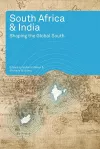
South Africa and India
8 authors - Paperback
£27.99
Jonathan Hyslop's book tells Bain's story in a way which breaks out of the boundaries of traditional South African history writing. It demonstrates that globalisation has much earlier roots than we think. The South Africa of the 1890s and early 1900s can only be understood by looking at what happened here in international context. The book shows how South Africa was deeply affected by such different forces as Indian and Irish nationalism, Australian and British labour politics, steamship travel and undersea telegraph cables, and international migration. The book offers us a better understanding of the origins of the globalised world in which we live. Bain, born in Scotland, came to the Rand in the early 1890s. His long career as political radical culminated in 1919, when he and trade union colleagues for one week overthrew the Johannesburg Town Council and Bain became 'dictator' of Johannesburg. In a massive general strike more than twenty people died in clashes with the British army. Louis Botha's government deported Bain to the UK, where he briefly became a national celebrity. Syndicalism, the name given at the time to the militant labour protests which he supported, seemed to be sweeping the world. To the newspapers Bain was "The Notorious Syndicalist". JT Bain was an extraordinary, contradictory character. He fought for the British in the Zulu War, and the Boers in the South African War. He was a spy and a newspaper editor, a lover of literature and a street fighter. He knew many of the leading figures of his day, including Gandhi, and was the sworn enemy of General Smuts.